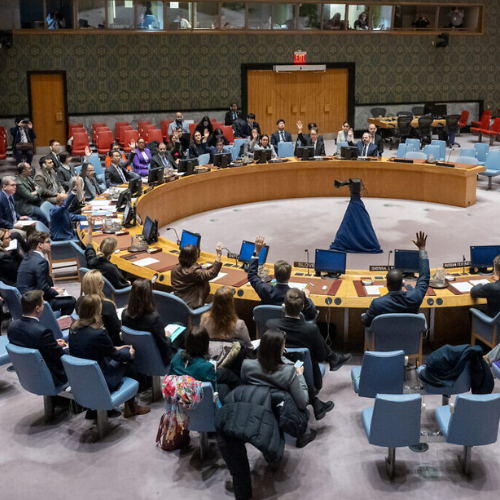The United Nations Security Council has a special committee that deals with global threats from terrorist groups like ISIL (Da’esh) and Al-Qaida. To stop these groups from doing harm, the committee places sanctions on people and groups that are believed to be involved with them.
Sanctions are serious actions. They include freezing the person’s money and bank accounts, not letting them travel to other countries, and stopping them from getting or using weapons. These steps are meant to limit the ability of terrorist supporters to move freely, get funding, or cause harm.
The committee works under several important Security Council resolutions. These include Resolution 1267 passed in 1999, Resolution 1989 passed in 2011, and Resolution 2253 passed in 2015. These documents guide how sanctions are applied and reviewed. A newer resolution, Resolution 2734 passed in 2024, was also used in a recent case to end sanctions on one individual.
This system is updated regularly based on new information from UN member countries and global organizations. The names of those who are added to or removed from the sanctions list can be found on the UN Security Council’s official website.
Removal of Sanctions from Hajajj bin Fahd al-Ajmi
On June 9, 2025, the UN Security Council Committee made an important announcement. It decided to remove Hajajj bin Fahd al-Ajmi from the ISIL (Da’esh) and Al-Qaida Sanctions List. This means that the earlier sanctions, such as the asset freeze, travel ban, and arms embargo, no longer apply to him.
500% Sanctions Bill Against Russia Killed by Trump’s Silence, GOP Freezes in Fear
This decision came after a full and careful review of a delisting request submitted through the Office of the Ombudsperson. This office gives individuals the chance to challenge their inclusion on the sanctions list. In this case, the Ombudsperson reviewed the evidence and prepared a detailed report. Based on this report, the committee agreed to remove al-Ajmi’s name.
Hajajj bin Fahd al-Ajmi was born on August 10, 1987, in Kuwait. He has been known by different names, including Hijaj Fahid Hijaj Muhammad Sahib al-Ajmi and Sheikh Hajaj al-Ajami. His removal from the list shows a change in the Security Council’s view of his actions and associations.
While this decision marks a change in al-Ajmi’s status, it also highlights the role of fairness and review in the UN’s sanction system. The process ensures that people can ask for their names to be removed when the conditions for the sanctions no longer apply.
Staying Updated on Sanctions Information
The ISIL (Da’esh) and Al-Qaida Sanctions List is not a fixed document. It is regularly reviewed and updated. This allows for changes when new facts are available or when someone’s situation changes. Anyone can view the latest version of the list on the UN committee’s website.
For those looking for a complete record, the Consolidated United Nations Security Council List includes all names currently under any UN Security Council sanctions. It combines multiple lists and provides one source where organizations, banks, and governments can check who is under restrictions.
The Office of the Ombudsperson plays a key role in this system. It allows people to challenge their listing and ensures that there is a fair process for review. The status of these cases and the results are made available to the public, which helps keep the process open and honest.
This transparency is important for keeping trust in the sanctions system. It also shows that the Security Council is not only focused on punishment but also on fairness and accurate information.
